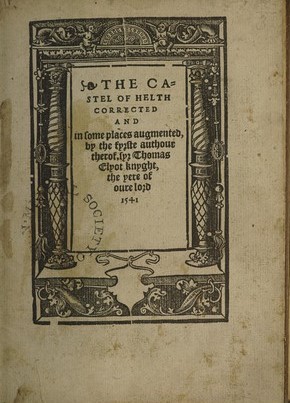Kay Bannell
Class of 2021, UCL History
2020-06-16

The Castel of Helthe, written by the English humanist and diplomat Thomas Elyot (1490-1546) and first published in 1539, would have been recognised by early modern readers as a ‘regimen’. Regimens were based on the idea that maintaining health was as important a part of medicine as treating illness, and thus The Castel advised readers on how to live a healthy life. Accordingly, it recommended such things as eating in moderation, balancing exercise and rest, avoiding stress, and staying on friendly terms with neighbours. Although regimens were not a new genre, The Castel was distinctive in that it was written in English, hence making such knowledge accessible to the general public, rather than being limited to the elite audience who could read Latin. Believing that everyone ‘shoulde knowe howe to kepe his body in good helth’, Elyot discussed learned medical theory in straightforward terms. For example, The Castel popularised the central component of learned medicine: the theory of the four humours. Discussing each of the humours – blood, yellow bile, black bile, and phlegm – it also described how the innate balance of these fluids in each person’s body accounts for their complexion. If blood dominated, the individual would have a sanguine complexion; if yellow bile, a choleric one, if black bile, melancholic, and if phlegm, a phlegmatic one. Arguably of more immediate interest for most readers, however, was Elyot’s discussion of the medical benefits and risks of certain foodstuffs. For instance, he informed readers of the efficacy of dates, eggs, and ginger in healing different parts of the body. He supplemented his discussion with the insights of ancient medical theory, such as Galen’s theory of curing by contraries (the idea that a hot and dry disease like fever should be treated with a cold and moist medicament). The Castel’s variety and accessibility made it extremely popular, with the work going into seventeen editions over the course of the early modern era.
References:
Stanford Lehmberg, ‘Sir Thomas Elyot’, Oxford Dictionary of National Biography, https://www.oxforddnb.com/view/10.1093/ref:odnb/9780198614128.001.0001/odnb-9780198614128-e-8782 (2008).
Mary Fissell, ‘Popular Medical Writing’, in Joad Raymond (ed.), The Oxford History of Popular Print Culture. Cheap Print in Britain and Ireland to 1660 (OUP, 2011).
